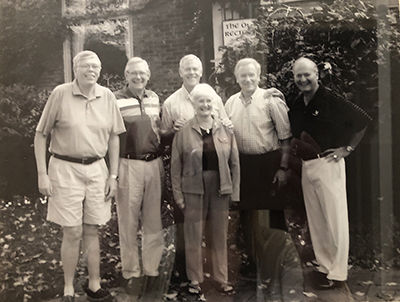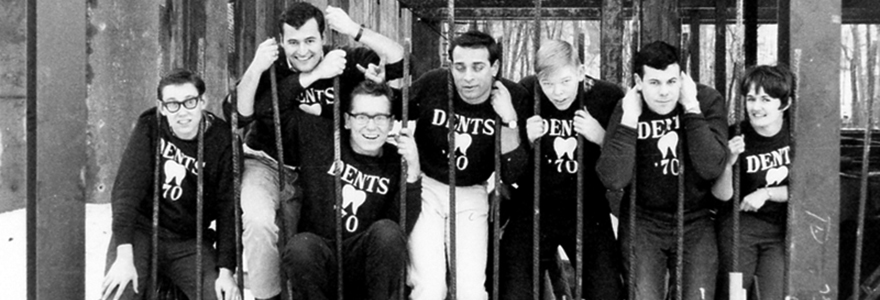First to 50
By Emily Leighton, MA’13
They boldly went where no one had gone before - the first students enrolled in Western University’s dental school. Their professors outnumbered them, the Dental Sciences Building was under construction and they spent the first two years of their studies learning alongside medical students. As the first graduating class, the Class of 1970 left a big mark, launching a legacy of exceptional dental education, research and care.
“It was a splendid class,” Dr. Wesley Dunn, Founding Dean, said in a 2015 video interview. “I liked the other ones that came along after, but it’s a bit like having your first child, it’s a little different. It didn’t take long to develop, what I consider to be, a very strong faculty.”
Three members of the Class of 1970 - Drs. David Kenny, John Lind and Marilyn “Maggie” MacLoghlin - reflect on their dental school experience, special memories and careers as they mark 50 years since their historic graduation.
The Experience
Why did you choose to study dentistry at Western, knowing the program was in its infancy?
Marilyn MacLoghlin: For exactly that reason, it was a pioneering opportunity. The small class size was wonderful - the faculty even outnumbered the students. We were one big, usually happy, family figuring things out together.
David Kenny: It was my interview with Dean Dunn.
John Lind: I read in The Gazette that there was to be a new dental school at Western. Walking through the Medical Sciences Building, I happened to notice an office door with the name “Dean of Dentistry” - I knocked on the door and met the new Dean, Dr. Wesley J. Dunn.
I was immersed in a new and exciting program that had a different page full of excitement every day. The most talented professors in their field filled the ranks and the dental building was under construction.
What is your class remembered for?
MM: So many firsts! First UWODSS council, first edition of the UWODSS journal, first Dentistry float in the Homecoming parade, first Dentistry faculty ball - the list goes on.
DK: Clinic Night for the London District & Dental Society members. That evolved into the poster presentations for Dentistry Research Day. The Miles for Millions Marches and the Corpuscle Cup blood drive competitions with the medical students.
JL: The one that comes to mind is Homecoming. I proposed that we build a giant toothbrush and mount it on my mother’s yellow Pontiac convertible with the top down. The materials were donated by my uncle, James G. Lind of Lind Lumber in Dorchester. We, as a group, walked beside the car supporting fluoridation.
The morning parade was beautiful with lots of sunshine, but the afternoon parade was different, it poured rain. My parents were in the stands and my father, Medicine Class of 1936, was so proud as he witnessed the convertible being dumped on by enormous amounts of water - it was never quite the same!
What is your favourite, stand-out moment from your time in dental school?
MM: Dean Dunn’s inaugural address to us on the first day of classes in September 1966.
DK: The birth of my daughter, Sarah. The first ‘Dentistry baby’, born on December 13, 1969.
JL: There are so many vivid memories. One of those was our first days in the new dental building and clinic. Each of us was assigned a state-of-the-art operatory. We were in our third year, surrounded by people who were the best in their field. We just knew this would be the best faculty in Canada, if not the world.
Dean Dunn and his wife, Jean, looked after us like an extended family. We were invited into their home at Christmas in our first year, a wonderful celebration of the Yuletide.
The Lessons
What was the most significant lesson from dental school that you took forward in your career?
MM: Keep calm and carry on.
DK: My basic and clinical education was the cornerstone of my credibility when working with physicians, surgeons and other health care professionals.
JL: The most important philosophy that I took forward was, “In dentistry, practice to the best of your ability and honour your patients. If you do this, you don’t have to worry about the money, it will follow.”
Who had the biggest influence on you or made your dental school experience special?
MM: Drs. Dunn, Guest, Dellow, Jordan and, of course, my classmates.
DK: Dr. Peter Dellow, a neurophysiologist, friend and mentor who, without me fully realizing it, guided the beginning of my career. Dean Dr. Wesley Dunn, a mentor and a constant friend throughout my dentistry career and beyond. Dr. Ronald Jordan, whose brilliant presentations set the standards that I, and many other clinical educators, strive to emulate.
JL: Dr. Wesley J. Dunn, Dean of the Faculty of Dentistry. He was the person who gave me the opportunity to do what I love best - dentistry. All of our professors, but the one who stands out for me is Dr. Ronald Jordan, Head of Restorative Dentistry. He was world renowned in his field. He was also the person who had to relinquish his secretary, Miss Karen Collier, to me as I started dating her in my second year and married her in third year.
The Times
What was going on in Canada and around the world during your studies?
MM: Trudeaumania, Expo 67 in Montreal, FLQ uprisings in Quebec, the Apollo 11 Moon Landing, assassinations of Martin Luther King Jr. and Robert Kennedy, the Women’s Liberation Movement, anti-Vietnam War protests and the first successful heart transplant.
DK: Expo 67 and Canada’s Centennial.
JL: Our nation was on the rebound!
What were you listening to?
MM: The Beatles, the Rolling Stones and the Beach Boys.
JL: The Rolling Stones, Pink Floyd, Queen, Led Zeppelin, The Beatles, the Eagles, the Bee Gees, ABBA.
The Profession
 What are your career highlights?
What are your career highlights?
DK: Founding Chief of Dentistry, the Children’s Hospital of Eastern Ontario, Ottawa; Dentist-in-Chief and later Director of Postgraduate Dental Research at SickKids, Toronto; Professor of Dentistry, University of Toronto.
MM: Working in conjunction with members of the medical profession to provide care to patients with temporomandibular disorders and sleep apnea issues.
JL: Upon graduation, I went to Brantford, my hometown. I went into solo practice and started with one operatory. Within six months, I was furnishing a second operatory. In 1981, I bought the building from my father and put on an addition that gave the practice an additional three operatories, a staff room and a laboratory. The practice grew to six operatories and a staff of 14 people.
I received a call from Dr. Ron Jordan, who nicely told me that on Fridays I would be teaching third and fourth year students. I didn’t object! As a result, I taught for 20+ years at Western.
I also served as treasurer, secretary and president of the Brant County Dental Society. I helped establish the Department of Dentistry at the Brantford General Hospital and I was honoured to have surgical and dental privileges in the operatory rooms there.
What are the biggest changes you encountered in the dental profession over the course of your career?
MM: Ability to bond to enamel and dentin, implants, reliable composite materials, intra-oral photography and digital radiography.
DK: Community dentists now treat a broader range of children with dental injuries, disabilities and chronic disease. As a hospitalist, I treated many children who would not have survived when I began my career.
JL: The most obvious is the materials we use in restorative dentistry - impression materials, composite filling material, sterilization, implants.
What advice do you have for dentistry students today?
MM: Keep the dental health of your patients the top priority, not esthetics.
DK: You will face unfathomable changes in society, economics and science during your years of practice ahead. Prepare for change with a solid understanding of science and critical assessment in order to communicate with other professionals. Also, attempt to educate patients who discount facts over opinion.
JL: Never stop learning. When I came to Brantford to practice, there were no endodontists, no periodontists, no oral surgeons. I took course after course in these fields until I perfected the procedures.









